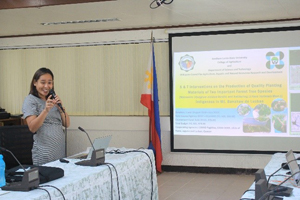 Protocols in producing quality planting materials of two indigenous tree species, Makaasim (Syzygium nitidum Benth) and Batikuling (Litsea leytensis Merr.) were developed in a project by the Southern Luzon State University (SLSU).
Protocols in producing quality planting materials of two indigenous tree species, Makaasim (Syzygium nitidum Benth) and Batikuling (Litsea leytensis Merr.) were developed in a project by the Southern Luzon State University (SLSU).
The protocols will help in producing quality planting materials of Makaasim and Batikuling, which are both threatened due to the demand for wood pallets, furniture, and wood carving. It will also support the needs of the wood-based industry and the National Greening Program of the government.
For. Kathreena Gutierrez, project leader, leads this project titled, “S&T Interventions on the Production of Quality Planting Materials of Two Important Forest Tree Species [Makaasim (Syzygium nitidum Benth) and Batikuling (Litsea leytensis Merr.)] Indigenous in Mt. Banahaw de Lucban.”
According to Gutierrez, with SLSU’s existing clonal nursery, they would be able to assist local government units (LGUs), nursery managers, and tree farmers to produce cloned seedlings at any time of the year and at any volume of seedlings. Cloning can also prevent the spread of diseases by producing disease-free and pest resistant clones.
Gutierrez and her team conducted Polymerase Chain Reaction (PCR) Cycling Condition for DNA Barcoding of Makaasim and Batikuling. They were able to develop protocols for the vegetative propagation of Makaasim and Batikuling, as well as cost analysis for the quality planting material production of both species. A detailed production cost for nursery production of planting stocks and more data on root and shoot growth of target species were also developed.
For the dissemination of R&D technologies and findings, the SLSU team conducted trainings on “Production of Quality Planting Materials: Vegetative Propagation using Mist System” and “Vegetative Propagation using Stem Cuttings of Batikuling in Non-Mist System.” They also produced information, education, and communication (IEC) materials such as posters and brochures about the research project including a botanical description of Batikuling, and a procedure on vegetative propagation of Batikuling using stem cuttings.
Funded by the Philippine Council for Agriculture, Aquatic and Natural Resources Research and Development of the Department of Science and Technology (DOST-PCAARRD), the project is expected to end on October 2019.
